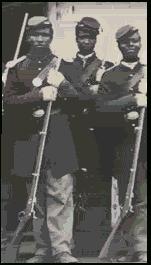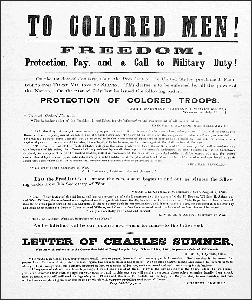"Once let the black man get upon his person the brass letter, U.S., let him get an eagle on his button, and a musket on his
shoulder and bullets in his pocket, there is no power on earth that can deny that he has earned the right to citizenship."
-Frederick Douglass
The issues of emancipation and military service were intertwined from the onset of the Civil War. News from Fort Sumter set
off a rush by free black men to enlist in U.S. military units. They were turned away, however, because a Federal law dating
from 1792 barred Negroes from bearing arms for the U.S. army (although they had served in the American Revolution and in
the War of 1812). In Boston disappointed would-be volunteers met and passed a resolution requesting that the Government
modify its laws to permit their enlistment.
The Lincoln administration wrestled with the idea of authorizing the recruitment of black troops, concerned that such a move
would prompt the border states to secede. When Gen. John C. Frémont in Missouri and Gen. David
Hunter in South Carolina issued proclamations that emancipated slaves in their military regions
and permitted them to enlist, their superiors sternly revoked their orders. By mid-1862, however, the escalating number of former
slaves (contrabands), the declining number of white volunteers, and the increasingly pressing personnel needs of the Union
Army pushed the Government into reconsidering the ban.
After the Union Army
turned back Lee's first invasion of the North at Antietam, MD, and the Emancipation Proclamation was subsequently announced,
black recruitment was pursued in earnest. Volunteers from South Carolina, Tennessee, and Massachusetts filled the first authorized
black regiments. Recruitment was slow until black leaders such as Frederick Douglass encouraged black
men to become soldiers to ensure eventual full citizenship. (Two of Douglass's own sons contributed to the war effort.) Volunteers
began to respond, and in May 1863 the Government established the Bureau of Colored Troops to manage the burgeoning numbers
of black soldiers.
By the end of the Civil War, roughly 179,000 black men (10% of the Union Army) served as soldiers in the U.S. Army and another
19,000 served in the Navy. Nearly 40,000 black soldiers died over the course of the war 30,000 of infection or disease. Black
soldiers served in artillery and infantry and performed all noncombat support functions that sustain an army, as well. Black
carpenters, chaplains, cooks, guards, laborers, nurses, scouts, spies, steamboat pilots, surgeons, and teamsters also
contributed to the war cause. There were nearly 80 black commissioned officers. Black women, who could not formally
join the Army, nonetheless served as nurses, spies, and scouts, the most famous being Harriet Tubman, who scouted for
the 2d South Carolina Volunteers.
Because of prejudice against them, black units were not used in combat as extensively as they might have been. Nevertheless,
the soldiers served with distinction in a number of battles. Black infantrymen fought gallantly at Milliken's Bend, LA; Port Hudson,
LA; Petersburg, VA; and Nashville, TN. The July 1863 assault on Fort Wagner, SC, in which the 54th Regiment of Massachusetts
Volunteers lost two-thirds of their officers and half of their troops, was memorably dramatized in the film Glory. By war's end, 16 black
soldiers had been awarded the Medal of Honor for their valor.
The black troops, however, faced greater peril than white troops when captured by the Confederate Army. In 1863 the Confederate
Congress threatened to punish severely officers of black troops and to enslave black soldiers. As a result, President Lincoln issued
General Order 233, threatening reprisal on Confederate prisoners of war (POWs) for any mistreatment of black troops. Although the
threat generally restrained the Confederates, black captives were typically treated more harshly than white captives. In perhaps the
most heinous known example of abuse, Confederate General Nathan B. Forrest shot to death black Union soldiers captured at the
Fort Pillow, TN, engagement of 1864.
The document featured with this article is a recruiting poster directed at black men during the Civil War. It refers to efforts by the
Lincoln administration to provide equal pay for black soldiers and equal protection for black POWs. The original poster is located
in the Records of the Adjutant General's Office.

On July 17, 1862, Congress passed the Second Confiscation and Militia Act, freeing slaves who had masters in the
Confederate Army. Two days later, slavery was abolished in the territories of the United States, and on July 22 President Lincoln
presented the preleminary draft of the Emancipation Proclamation to his Cabinet members.
(see poster at left)

 During the Civil War ex-slave Frederick Douglass observed, "There are at the present moment, many colored men
in the Confederate Army doing duty not only as cooks, servants and laborers, but as real soldiers, having muskets on their
shoulders and bullets in their pockets, ready to shoot down ... and do all that soldiers may do to destroy the Federal government."
During the Civil War ex-slave Frederick Douglass observed, "There are at the present moment, many colored men
in the Confederate Army doing duty not only as cooks, servants and laborers, but as real soldiers, having muskets on their
shoulders and bullets in their pockets, ready to shoot down ... and do all that soldiers may do to destroy the Federal government."
Dr. Lewis Steiner, a Union Sanitary Commission employee who lived through the Confederate occupation of Frederick, Maryland said, "Most of the Negroes...were manifestly an integral portion of the Southern Confederacy Army." Erwin L. Jordan's book "Black Confederates and Afro-Yankees in Civil War Virginia" cites eyewitness accounts of the Antietam campaign of "armed blacks in rebel columns bearing rifles, sabers, and knives and carrying knapsacks and haversacks." After the Battle of Seven Pines in June 1862, Union soldiers said that "Two black Confederate regiments not only fought but showed no mercy to the Yankee dead or wounded whom they mutilated, murdered and robbed."
In April 1861, a Petersburg, Virginia newspaper proposed, "Three cheers for the patriotic free Negroes of Lynchburg." after 70 blacks offered "to act in whatever capacity may be assigned to them" in defense of Virginia. Erwin L. Jordan cites one case where a captured group of white slave owners and blacks were offered freedom if they would take an oath of allegiance to the United States. One free black indignantly replied, "I can't take no such oaf as dat. I'm a secesh nigger." A slave in the group upon learning that his master refused to take the oath said, "I can't take no oath dat Massa won't take." A second slave said, "I ain't going out here on no dishonorable terms." One of the slave owners took the oath but his slave, who didn't take the oath, returning to Virginia under a flag of truce, expressed disgust at his master's disloyalty saying, "Massa had no principles."
Horace Greeley, in pointing out some differences between the two warring armies said, "For more than two years, Negroes have been extensively employed in belligerent operations by the Confederacy. They have been embodied and drilled as rebel soldiers and had paraded with white troops at a time when this would not have been tolerated in the armies of the Union." General Nathan Bedford Forrest had both slaves and freemen serving in units under his command. After the war, General Forrest said of the black men who served under him "These boys stayed with me ... and better Confederates did not live."
It was not just Southern generals who owned slaves but northern generals owned them as well. General Ulysses Grant's slaves had to await the Thirteenth Amendment for freedom. When asked why he didn't free his slaves earlier, General Grant said, "Good help is so hard to come by these days."
These are but a few examples of the important role that blacks served, both as slaves and freemen in the Confederacy during the War Between the States.
The flap over the flag of the Confederacy is not quite as simple as the nation's racial experts make it. They want us to believe the flag is a symbol of racism. Yes, racists have used the Confederate flag, but racists have also used the Bible and the U.S. flag. Should we get rid of the Bible and lower the U.S. flag? Black civil rights activists and their white liberal supporters who're attacking the Confederate flag have committed a deep, despicable dishonor to their patriotic black ancestors who marched, fought and died to protect their homeland from what they saw as Northern aggression.